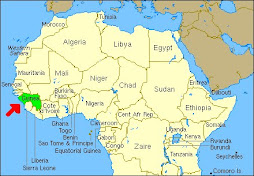Earlier this week a fellow volunteer, the gentleman who had served here as a Peace Corps Volunteer in the 60’s, asked if any of us wanted to go exploring and find an old bar he used to frequent back in the day. I was ready for a little adventure and happy to see a bit more of Conakry.
The bar, called La Paillotte, or The Grass Hut, was still there and as alive as ever. A few things had changed since the 60’s. (Namely, there used to be a pit of alligators right outside the dance floor. How combining drunken dancing people with large-toothed reptiles was a good idea, I have not yet deciphered. Alas, the alligators are no more; the pit is cemented over.) There are probably a few more plastic flowers strewn around the bar than in the 60s. I’m not sure if plastic flowers were as prolific in Guinea then as they are now, but fake flowers are the answer to every decorating question.
Equally interesting was that in the 60’s, Guinea was at the height of its communist days. East Germans diplomats and spies frequented the bar in a day when tourists weren’t even allowed into the country! (Why they let Peace Corps in, who knows, but my friend and his crew did get the boot only halfway through their service, escorted out of the country by the military in ’67, when Guinea decided it had had enough of foreigners.)
My volunteer friend told folks about his young heady days of the 60s, and they were thrilled that the older wiser man had come back to pay a visit. I just got to ride along on his coattails and get free beer. But I got a few other freebies that night, and it was my first encounter with the epic Guinean generosity I’ve heard so much about.
The original bar owner had passed away only recently, but his replacement sat us down to chat, and immediately asked what she could give us to drink, on the house. The new owner is a lovely woman, Mrs. Ganaba Sylla Touré. She’s well dressed and made-up, and speaks articulate French. I’m impressed that she’s at the head of this establishment. As we talked, I learn that she’s from Dabola, my future post! She was very excited to learn this, and immediately proceeded to write down the phone numbers of her entire family so I can call them once I arrive.
As our conversations continue, it comes up that I don’t yet have a Guinean name. “Well, you’ll take my name! Ganaba!” Hmmm, I ponder that. Several folks have offered me names already, and I usually waffle, not liking the sound of it. I’m picky! I want my new name to be just right, not too common or boring, but also not too far out. The name Ganaba, she tells me, is apparently somehow interchangeable with other variants: Zaïnab, Nabou—it’s all the same name. Ganaba seems a little heavy on my tongue, Zaïnab sounds so foreign, but Nabou, I like. Pronounced nah-BOO, it reminds me of one of my mother’s many nicknames for me, Boo. The familiarity feels comfortable. I render my verdict on Nabou, happily accepting my new name.
Content with my newfound identity, I lean back and sip my beer. “You know who else has our name?” Ganaba asks me. I stop to think.
“No, who?”
“The Prophet’s daughter!”
I almost spit out my beer. The original Zaïnab was certainly not sipping beer when she got baptized. I feel sacrilegious, and subconsciously hide my beer under the table, out of sight of Islam and out of respect for my honorable namesake. Woops!
As the evening wore on, Ganaba took off one of her many bracelets and just gave it to me—cadeau. As 8pm approached, my fellow volunteer and I had to head back to the Peace Corps house to beat our curfew, which is in place as long as we’re in Conakry waiting for election results. We prepared to call a cab, but Ganaba would have none of it. She summoned her personal driver and before we knew it, we were off in her shiny black sedan. In the space of a couple hours, I had acquired a new name, a bracelet, a free ride home, a pleasant buzz, and most memorably, a first insight into Guinean generosity. And all this from a woman I’d only just met! When it’s that easy to become homonymes and friends, I get excited and anxious to meet more Guineans, to get out of the bubble of the Peace Corps house, and to see this country. Now there’s just one thing left—deciding my Guinean last name!
Election update: As of late Monday night results are IN from the November 7 Presidential run-off!! As the results were announced, an unexpectedly late storm pounded Conakry, rain washing the streets clean. Symbolic? We can only hope. The Electoral Committee cleverly released the results on the eve of the Fête de Mouton, or Eid al-Adha, one of the largest Muslim holidays of the year, when people are expected to be visiting friends and family, eating sheep (in memory of Abraham’s willingness to sacrifice his son, before the sheep handily stepped in), and generally, not violently protesting. Most folks seemed to stay close to home yesterday, celebrating the Fête on a scaled-down level. Guinea’s Supreme Court now has eight days to confirm the election results. Once things are calm, we’ll head to our posts. It’s true that there has been unrest in Conakry, I can hear the gunshots, but I’m happily hunkered down in the Peace Corps house with plenty of reading material and a very large stash of yogurt (although no sheep). Hopefully, the supporters of the losing candidate, Diallo, who have been quoted as saying “Victory or Death!” will take another look at that stance… I’m encouraged to know that the roughly 2,000 election observers from the Carter Center, the European Union, and local groups did not find the “massive fraud at all levels” that Diallo has accused. I’m equally curious to see if Condé, the winning candidate, will make good on the pledge both candidates made prior to elections to include the other in a unity government, and if extending the olive branch would quiet the street riots. I’ll limit my public commentary on elections for now since it’s a sensitive, political subject likely to get me into trouble, and I’m here to serve all factions as an apolitical volunteer. You can read more here, or feel free to send me an e-mail or a comment on the blog if you’re curious to know more.
I'm baaaaaaaack....
13 years ago






